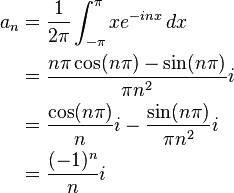How to find $1+1/2^2+1/3^2+...$ using Fourier Series. I have already worked out that the Fourier cosine series for $f(x) = x$ is:
$x = \frac{4L}{\pi^2} (1+\frac{1}{3^2}+\frac{1}{5^2} \cdots) -\frac{4L}{\pi^2}(\cos{\frac{\pi x}{L}}+...+\frac{1}{n^2}\cos{n \pi x/L}+...)$ where n is odd.
hint given is to evaluate this expression at $x = 0$. But then I just get $0 = 0$?
Edit, I have already worked out $1+1/3^2+1/5^2+... = \pi^2/8$




